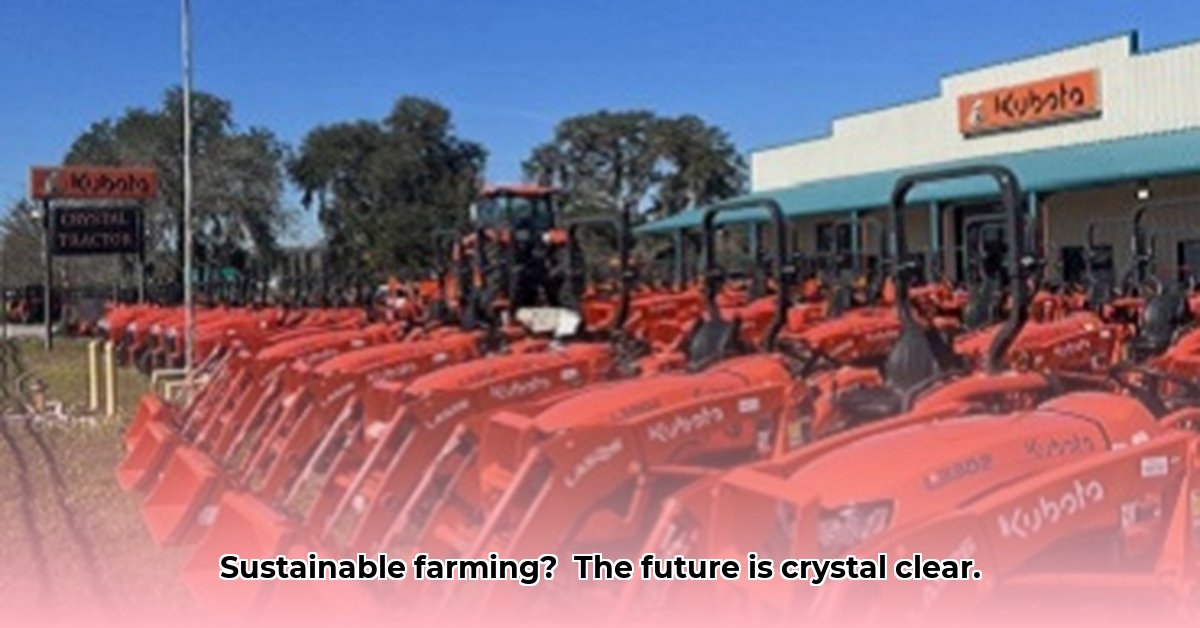
The Rise of Sustainable Agriculture in Tallahassee and Beyond
Farming is undergoing a dramatic transformation. The traditional model, while effective for generations, is increasingly unsustainable. Soil erosion, water pollution from chemical runoff, and greenhouse gas emissions are significant concerns. Sustainable agriculture offers a solution, focusing on resource efficiency, environmental protection, and soil health. This shift is driven by both consumer demand for ethically sourced food and a growing awareness of the urgent need for environmental stewardship. This article explores the technological advancements driving sustainable farming practices and examines the role of local dealerships, such as Crystal Tractor Tallahassee, in facilitating this crucial transition. Learn more about modern agricultural technology at this helpful resource.
Smart Technology: Precision and Efficiency in Sustainable Farming
Modern technology is revolutionizing farming practices. Precision agriculture, utilizing GPS-guided machinery and variable rate technology (VRT), allows for targeted application of fertilizers and pesticides. This minimizes waste, reduces environmental impact, and improves resource efficiency. For example, GPS-guided tractors reduce fuel consumption by minimizing overlap during field operations. Studies consistently show savings of 5-10% on fuel alone with GPS integration. Isn't that a compelling argument for adopting such technologies?
Electric tractors are also gaining traction, offering a cleaner alternative to traditional diesel models. Their quiet operation and reduced emissions make them increasingly attractive to environmentally conscious farmers. Furthermore, sophisticated farm management software enables farmers to track various aspects of their operations, from planting to harvesting, allowing for data-driven decision-making and improved resource allocation. These integrated systems offer a holistic approach to maximizing yields while minimizing environmental impact.
Overcoming the Barriers to Sustainable Farming
While the benefits of sustainable farming are undeniable, several hurdles hinder widespread adoption. The initial cost of new equipment can be prohibitive for many farmers. Training and technical support are needed to effectively utilize these advanced technologies. Access to resources, including financial assistance and educational programs, varies significantly. However, government incentives such as grants and subsidies are becoming increasingly prevalent, aiming to offset the costs associated with transitioning to more sustainable practices. These initiatives are vital for encouraging widespread adoption of these eco-friendly technologies. How can we further incentivize these critical shifts towards sustainability?
Crystal Tractor Tallahassee: A Partner in Sustainable Agriculture
Crystal Tractor Tallahassee plays a vital role in connecting local farmers with the latest sustainable technologies. Their role extends beyond equipment sales; they provide training to ensure farmers effectively use their new tools and can offer support to troubleshoot any issues. By empowering farmers with knowledge and access to the right resources, Crystal Tractor Tallahassee not only boosts individual farm profitability but also contributes to the overall health of the local food system and the environment. Their commitment to sustainable agriculture fosters a more resilient and environmentally conscious agricultural sector.
Actionable Steps for Transitioning to Sustainable Farming
Farmers seeking to adopt sustainable practices can take several concrete steps:
Conduct a thorough assessment of your current farming practices and identify areas for improvement. What resources are being wasted? Where can efficiency be increased?
Research sustainable agricultural technologies available. Explore both the latest advancements in machinery and software solutions.
Seek out government grants and subsidies. Many programs exist to support farmers transitioning to sustainable practices.
Invest in training. Understanding how to effectively use new machinery and software is critical. Attend workshops and utilize available resources.
Start with a pilot project. Implement sustainable practices on a smaller scale to test their effectiveness before a complete overhaul.
Collaborate with other farmers. Sharing knowledge and best practices can accelerate the transition to sustainability.
Continuously monitor and adapt. Sustainable farming is a continuous process of learning and improvement.
The Future of Sustainable Farming in Tallahassee
The future of agriculture in the Tallahassee region hinges on embracing sustainable practices. The growing demand for sustainably produced food, coupled with technological advancements and government support, positions the area for a successful transition. Dealerships like Crystal Tractor Tallahassee will play an increasingly pivotal role in this transformation, providing farmers with the tools and knowledge necessary for both profitability and environmental stewardship. The journey towards a sustainable food system is a collective effort, requiring collaboration among farmers, businesses, and policymakers. How can we further encourage and amplify this necessary collaboration?